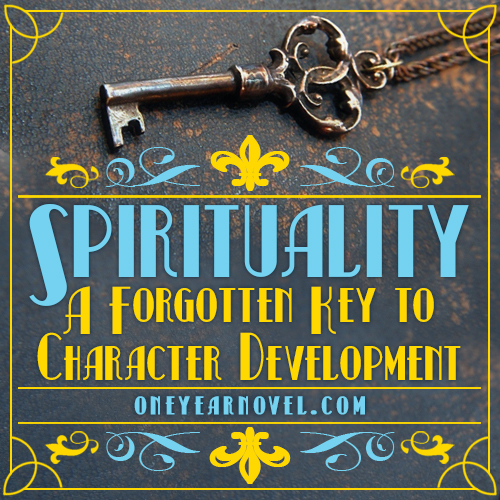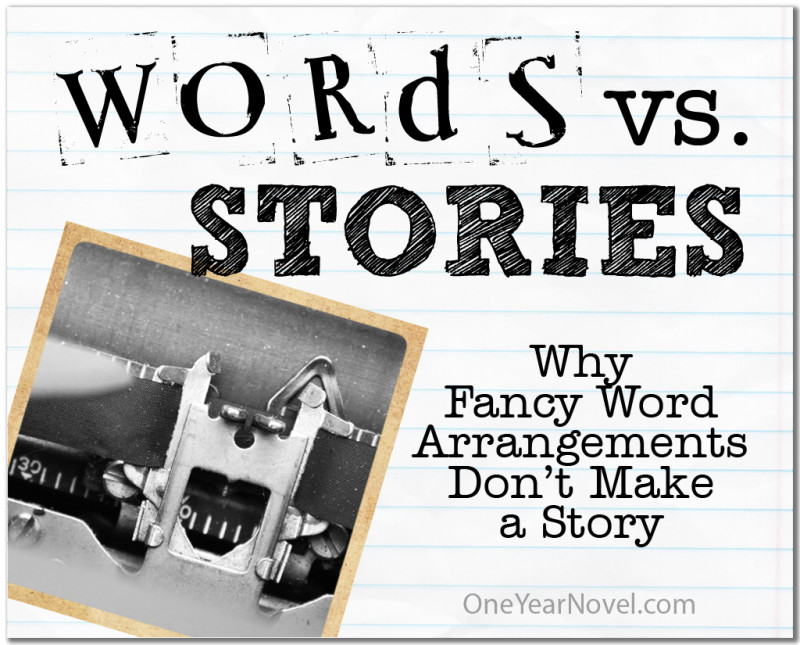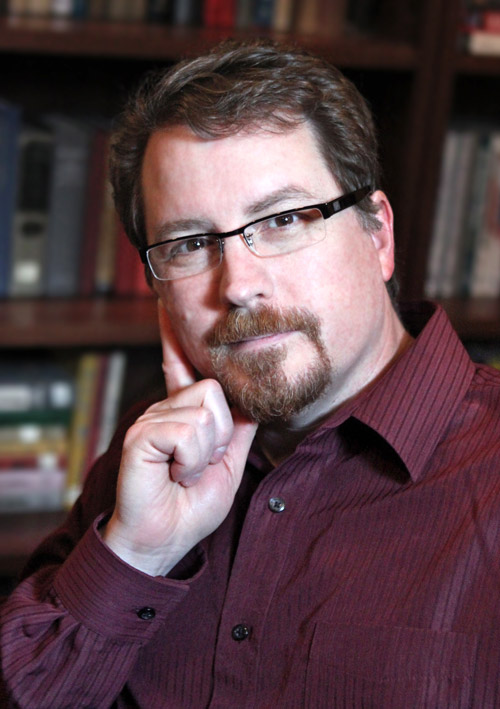Spirituality: A Forgotten Key to Character Development
 By Hannah Tacci, Student Contributor
By Hannah Tacci, Student Contributor
Just reading the title of this post, you may be internally screaming, “PREACHY TOPIC!” However, this isn’t a post about religion in story. If you want that, I highly recommend Rachel’s “Telling a Religious Story Without Being Preachy” blog series.
This post is about how your characters are more than the things that happen to them. They have an inner life—a spirit—and so their character development needs to reflect that. If you’re like me, you’ve managed to complete a second draft of your One Year Adventure Novel project, write about character weakness, and only then remember that Mr. S. talks about giving the hero a weakness. Ha! But writing out this piece is how it clicked for me.
Before I share what I’ve learned about the connection between spirituality and character weakness, I want to mention that I’m going to be talking about Christian spirituality in this post. I realize that not all students who use The One Year Adventure Novel are Christians, but being one myself has shaped my worldview and opinions for this post, as well as caused my writing and observations to heavily reflect my beliefs. If that doesn’t sound helpful to you, feel free to stop reading!
Okay, on to character weakness and spirituality.
I believe people are spirit-beings.
That sounds creepy, but as my friend puts it: “We don’t live in a physical world with spiritual elements. We live in a spiritual world with physical elements.”
People are always searching for worth and value—sometimes in the right place and more often than not, in the wrong place. We are created by God in His image, yet born with an emptiness that can only be filled by God, but so often we look to fill that elsewhere. All the searching that we do can be tied back to unawareness of—or a lack of belief in—what God says about Himself and about us.
People are weak. We struggle, even with small things.
At Summer Workshop 2017, Steve Laube gave a talk called “Losing Wait the Write Way.” He really focused on the weaknesses of people, showing us how we all have struggles, and that we aren’t the only ones in the world with problems. He had us write a few of our most pressing life issues on a scrap of paper, and they were placed in a container and brought on stage. Mr. Laube picked up the first paper from the overflowing container and read it aloud. You know what? No one wrote down their most pressing problem as, “Kill the Black Pirate of Doom and find the treasure.”
We wrote things like, “don’t know what to do with my life,” “anxiety,” and “depression.”
Some were pretty intense.
Your characters must have something of the same problems. Sure, they’ll have the main goal of finding the Black Pirate of Doom, but what inner struggles do they have? Your character’s emptiness needs to be exposed, and they need to look to fill that hole with something. Some characters will fill it with God, and some won’t.
What is your character’s emptiness? Is he lonely? Afraid? Self-conscious? People turn to addictions and/or run from their problem in several ways. Not all addictions come in the form of drugs and alcohol. Some people fill their life with their job, some are addicted to the gym. Some people oversleep. Some overeat. Watch TV. Gamble. Write blog posts instead of working on their Work-In- Progress. *coughs*
What is your character’s subtle addiction? What does he turn towards to try to fill his emptiness? How does he run from his problem? How do these coping mechanisms help for a little while? How do they fail? How do they reinforce the problem?
One of the most important realizations I’ve come to, in learning to write, is that characters need to struggle aside from the overarching story goal. Again, the fact that nobody in Steve Laube’s session wrote down “Defeat the Black Pirate of Doom” is telling. The problem shouldn’t be completely disjointed from the story, but it still needs to be an everyday problem. What is your character’s most pressing difficulty, apart from the main story goal?
Digging even deeper:
- How does the struggle tie into how the character views himself and God?
- How is that struggle resolved at the end?
- What hope, or lack thereof, is there at the end of the story in relation to the resolution of that problem?
It doesn’t matter when your story takes place historically: all people struggle. As the Bible says, “There is nothing new under the sun.” This concept works in your fantasy or sci-fi novel as well because even if your characters are talking bunnies or hybrid cyborg-men (maybe not the robot characters…), they are mirroring what people are like. They have personalities, they talk, they have feelings, and so on.
Here is my brainstorm of possible ways a character could struggle spiritually. I hope they give you some idea of the range of possibilities.
Does the character struggle with knowing if they’re truly saved—does fear of dying and going to Hell keep them awake all night?
Do they struggle with legalism: knowing Christ died for them, but they still somehow try to earn their salvation?
What is that one sin that keeps dragging them down?
Does the character feel unwanted and ugly?
Does the character feel weak and like a failure compared to his seemingly perfect older brother (keeping in mind that the older brother could struggle with pride while hating that pride)?
What about the character, Scott, who keeps all his feelings bottled up inside himself. There is that one person, Edgar, he would usually tell his struggles to, but Edgar is dealing with issues that Scott sees as so much more “significant” than his own. Scott doesn’t want to add to Edgar’s problems, so he keeps his “smaller” struggles to himself, and they weigh him down and discourage him because he has no one to tell.
Finding gender-specific struggles can be interesting too, because often males and females handle things differently.
You know what Steve Laube’s session did? It helped all of us relate to each other and see each other as real people with real problems. It was a relief to know that I’m not the only one who doesn’t have it all together.
Giving your characters “everyday problems” will do the same for your readers. They will have a sense of connection to your character because the problems relate to those the reader has experienced. They are meaningful to the reader, and they make him feel something. And that is the goal of a Story: to create emotion.
…
What is your character’s most pressing problem, apart from the main story goal?
…
Hannah Tacci admires courage, honor, and humility. When she’s not at the barn or procrastinating, she writes. She loves instrumental music, words, critiquing, and creating writing tips through discovering the layers and depth of the art. You can find her trying to talk herself into eating healthier, exercising more, and failing at both. She wants to pursue loving Jesus more and has a heart for those who serve our country.
Hannah lives with her parents, brother, and much-loved Pit Bull, Sophie. She finds it funny that she has an artsy bio, when she tends to laugh inside at the people who have them.




Wow! I love this blog! It is surprising & motivating.
Surprising because my impression about Mr. S’s curriculum is that he wants students to leave ‘God characters’ out of stories (perhaps I’m misunderstanding something), and motivating because, even though I’m an OYAN mom, I have my own desire to write. ☺ So I love your ideas 😀 but I’m wondering how you show these spiritual struggles of your characters without introducing a God character in your story. I’m a Christian also & I feel like I have nothing to write about & no reason to write if my writing doesn’t include spiritual battle & the effects it has on people for or against Christ. Thanks for your insight.
I really like Hannah’s post too! In response to your question about my approach to God as a participant in a story world, I don’t say that writers should leave God or spirituality out. I do advise students not to put a God character in their novel, by which I mean a literal character who represents a one-to-one reflection of the God of the Bible.
Sometimes beginning writers like to create allegorical representations of God. They love Aslan, for instance, and try to recreate some version of him. But even Aslan is somewhat disguised, and only represents a few aspects of God’s nature. The main problem is that such characters are very difficult to pull off believably. C. S. Lewis didn’t attempt Aslan until he was very accomplished and had already written his space trilogy, which incorporates angelic beings but makes no attempt at creating a God character.
I would also suggest that making a God character can be problematic in another way. I have noticed that God characters often don’t work on me because I am usually aware of the writer’s human presence behind the character pulling the strings. In other words, as humans, we are not capable of making a representation of God that accurately represents Him. Perhaps this is why we are told not to make graven images; there is only one image of Him that is accurate.
But I don’t mean that a character can’t represent some Christlike quality. Jesus uses a father in the parable of the prodigal son to represent God’s attitude towards lost humanity. That father is not a God character; he doesn’t stand in for everything God is. He embodies something particular about God.
Lastly, I agree with Hannah that we are spiritual beings. And I agree with you that a character’s spiritual struggles are an important part of their identity. But those things don’t necessarily require a God character. You can incorporate a character’s faith in God–or lack of faith in God–without needing God to appear in the story as a waiter or a cab driver.
I hope this makes sense. I am happy to discuss this with you further if you want. And I hope you pursue your desire to write!
https://clearwaterpress.com/oneyearnovel/blog/case-religion-novel/
https://clearwaterpress.com/oneyearnovel/blog/telling-religious-story-without-preachy/
Hi Elizabeth,
You might find these helpful.
I also think that you will find that a lot of OYANers are Christian authors and have Christian characters. I am/do have Christian characters.
I also think that part of Mr. S.’s advice was to not have the ending of your story be a place where an amazing coincidence happens that could have only been God saving the day. God works in incredible ways, but He is probably not the MC of your novel and therefore shouldn’t be the one to make the story resolve.
Also, a lot of good stories have Christian characters: think Frank E. Peretti’s novels.
I hope I’m not encroaching on your answer, Mr. S.! 🙂